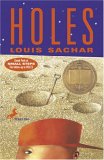Book Club Discussion Questions
In a book club? Subscribe to our Book Club Newsletter!
Please be aware that this discussion guide will contain spoilers!
In
this funny yet poignant story, a boy embarks on a personal journey
that changes his life, as he spends the summer paying for a crime he
didn't commit.
Stanley Yelnats, falsely arrested for stealing a pair of sneakers, is
sentenced to serve time at Camp Green Lake, a juvenile detention
facility in the middle of a Texas desert. Having never attended summer
camp, Stanley naively believes this to be a new opportunity. He is
soon faced with a group of unhappy, unaccepting campers (inmates) and
an evil warden who uses the boys to dig holes in search of buried
treasure.
As the summer progresses, Stanley makes some startling discoveries
about himself, the true meaning of friendship, and the ancient curse
that has haunted his family for generations. In a parallel story about
Stanley's "no-good-dirty-rotten-pig-stealing-great-great-grandfather,"
the mystery of the curse is unveiled and Stanley, in his efforts to
help a friend, suddenly finds himself in control of his own destiny
and the fate of his unlucky family.
Teaching Ideas
Holes is really two stories: one chronicles the unfortunate
life of Stanley Yelnats and the other is a tall tale about Stanley's
great-great-grandfather who meets his fate when he encounters Kissing
Kate Barlow, a feared outlaw of the Wild West. Sachar's success at
blending outlandish humor with poignant and heartwarming scenes makes
this book ideal for reading aloud and for a novel study. Students will
find satisfaction in the ending and celebrate the fact that the good
guys win.
A sense of self, belonging, courage, and friendship are important
themes to explore. Ideas and activities for interdisciplinary
connections include the language arts, social studies, science, math,
and arts curriculum.
Pre-Reading Activity
Have the class research juvenile detention centers in their state. Ask
them to investigate the purpose of a juvenile detention center. How
does the state work to rehabilitate juvenile offenders? What is the
purpose of a probation officer? How is it determined whether a
juvenile can be tried as an adult?
Thematic Connections
Belonging
Stanley is overweight and considered a misfit by the boys in his
school and neighborhood. Ask students to discuss why Stanley is an
easy target for bullies. At what point in the novel does Stanley begin
feeling that he is a part of the group? Who is the leader? How do the
guys view Stanley at the end of the novel? How might Stanley be
considered a hero? Involve the class in a discussion about how
Stanley's heroic status might change the way his classmates view him
when he returns to school in the fall.
Sense of Self
Ask students to make a list of the campers and their nicknames.
Discuss the significance of each boy's nickname. Why is Stanley called
Awards
1999 Newbery Medal Winner
Winner of the National Book Award
The Boston Globe — Horn Book Award
ALA Best Book for Young Adults
ALA Notable Children's Book
ALA Quick Pick for Young Adults
NCTE Notable Children's Book in the Language Arts
The New York Times Book Review Notable Children's Book of the Year
Publishers Weekly Best Book of the Year
Copyright
Prepared by Pat Scales, Director of Library Services, South
Carolina Governor’s School for the Arts and Humanities, Greenville,
South Carolina. Reproduced by permission of Random House.
Unless otherwise stated, this discussion guide is reprinted with the permission of Yearling.
Any page references refer to a USA edition of the book, usually the trade paperback version, and may vary in other editions.
